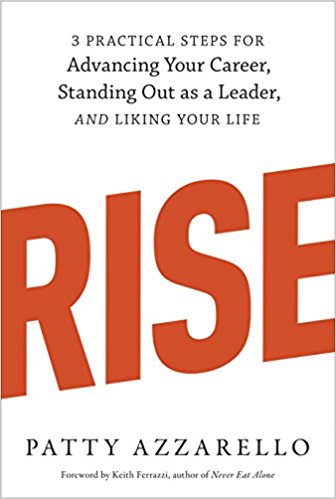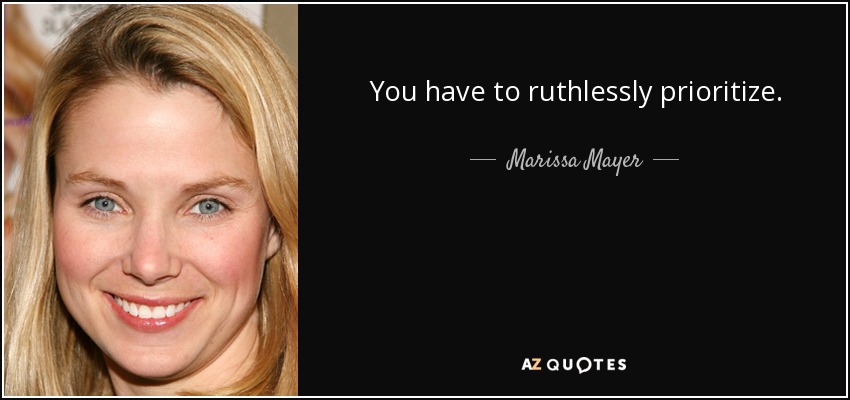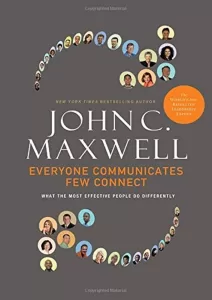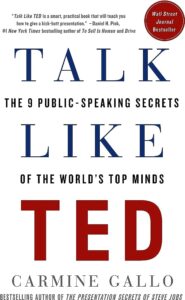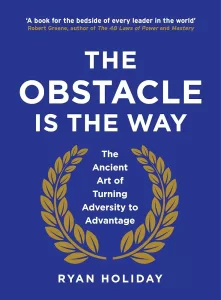Book Review: “Rise”
Book: Rise by Patty Azzarello
Reviewer: Bobby Powers
My Thoughts: 8 of 10
Rise is an empowering book. It's a book that frees you to focus on the truly important things of your job rather than getting caught up in the minutiae of day-to-day tasks that threaten to bog you down. Author Patty Azzarello encourages leaders to be confident in their abilities, seek to give more than they receive, and ruthlessly prioritize time in order to be successful. She offers tangible ideas for freeing up more time to focus on higher-level projects.
Takeaways from the Book
Deal with the Chaos
- “No one other than YOU has any motivation whatsoever to make you less busy…If you are overwhelmed by the activities of your job and you use up all your time and energy on your current job, you are not ready for a bigger one. Simple as that.”
- “It’s important to realize that not only do you have permission, but also as a leader you are expected to be able to deal with an overwhelming workload and not be overwhelmed. That’s the job.”
- “Your job as a leader is to deal with chaos and pressure and make it more manageable. You are supposed to create systems and processes to get more done with less effort. You are expected to think strategically, prioritize, and focus on the most critical tasks. But you’ll never get to do any of this if you don’t first give yourself permission to be less busy.”
- “Just know that it’s not the work that matters; it’s the outcomes you deliver. You don’t win the game for running up and down the court; it’s the points on the board that count.”
- "Trust that giving yourself time to think will help you find ways to deliver higher-value business outcomes and get the right work done in less time."
Ruthlessly Prioritize
- “Overachieve where it counts.”
- “Simply put, highly successful people don’t do everything. Watch them. They drop the ball on all kinds of things. They disappoint people. They may have disappointed you from time to time. But if they are successful, the other thing that you will notice is that they have a ruthless focus on the things they care about.”
- “The ability to work this way is not a status that is granted to you. These people were not given permission to focus on a few things and drop others. They were not less busy or less constrained than others. They took risks. They worked it out. You need to work it out.”
- “The work almost never comes across the table at you the way you should do it."
- “Because you are genuinely succeeding at the things that have the biggest impact on this business, you’ll be forgiven for the things you don’t get done.”
- “You need to communicate your Ruthless Priorities over and over and over again…Unless you are completely sick and tired of talking about your message, you aren’t even close to getting your audience to adopt it.”
Make More Time
- “Take some time back. Just take it. Actually schedule time to think. If you have no time to think, you will continue to use up all your time. For a start, schedule two hours per week and hide.”
- “Make your container of time for your current activities smaller…Decide how much time various areas of work are worth, and don’t exceed that amount of time.”
- “Don’t resolve things that don’t need to be resolved.”
- Have a “Don’t Do” list.
- Create a list with three columns: (1) Things I am getting done (2) Things you think I am doing that I am not (3) Things I know are important that I can’t get to at all
- “Successful people fail more than unsuccessful people. They try a lot, they do a lot, and they fail a lot. They just get over it and keep going.”
Working with Your Strengths
- “Manage your circumstances to ensure you’ll be doing what you are naturally good at most of the time.”
- “Once you have your strengths in focus, you need to think about how you can tune your job to put yourself in your ‘power alley’ more of the time.”
- “I love my job. I am doing exactly what I am really good at. It’s taken me twenty years to get all the stuff I suck at out of my job description.”
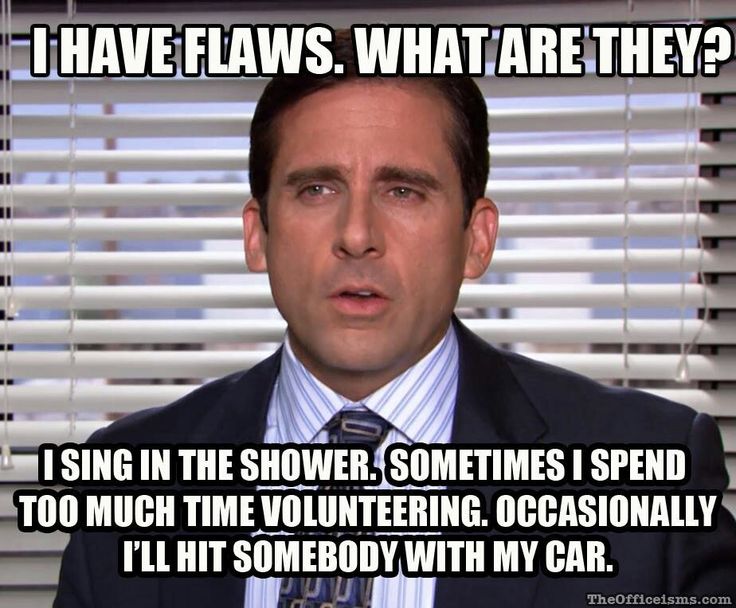
The Level Dilemma
- “Each time you step up a level, what it means to be good at your job changes.”
- “Your value is in developing strategy, people, and teams, not in delivering the work personally.”
- “As a leader who has stepped up, you need to associate your value with different stuff. If you don’t start to associate your value with the higher-level managerial and leadership work, you will automatically gravitate back to the detail, because that is where you feel the value is. You’ll keep working at the wrong level, and you’ll fail to do an effective job as a leader.”
- “Being stuck in the content and detail is working in the business. Rising above the content to lead and build capability in your team is working on the business. Essentially, you want to spend more time thinking and less time doing. If you are spending all your time doing, you are probably not working on the business.”
Trust
- “I have never seen a smart person damaged by letting a smarter person thrive beneath him or her.”
- “If you send people the signal that you trust them, and you encourage them to do big things, they will be more motivated to do big things. And more often than not, they will do them.”
- “The hardest part about building trust is that you need to be unfailingly consistent. As soon as you let up, change your mind, disappear for a while, don’t pounce on a consequence, let something slide, fail to give credit, or back off on communicating, you are degrading trust. I have a mentor who describes this part of leadership as ‘the hard, boring, and required stuff.’ Stay ever diligent on measures, consequences, and communicating. The payoff is big.”
- “The higher you go, the more you need the support of others. As you advance, success becomes less about what you yourself can do and more and more about what you can accomplish through others.”
Authentic Networking, Not Politics
- “Keep in mind that networking as two distinct parts: (1) Keeping in touch with the people you already know (2) Meeting new people.”
- “Most of the power from networking actually comes from keeping in touch with the people you already know.”
- “Networking is actually about giving, not taking…Once you start to think about building your network by what you can give, and by adding genuine value for others, it becomes much more meaningful and feels much less political. Remember, your network only has value if you put value into it.”
- “The trick to authentic networking: Give when you don’t need anything. Take less than you give—always.”
Confident or Fearless: Your Choice
- “Fearlessness is partly about having the imagination to see yourself in that role, deserving that role. It is also about being willing to go there before you feel ready and comfortable. Over and over again, I have seen less-talented, less-qualified people move beyond higher performers for the sole reason that they were willing to do so.”
- “If you aspire to big things or the top jobs, you can’t get there without putting aside your confidence issues and just doing it anyway. If you are smart, you will catch up with your leap. I promise. I’ve done this with pretty much every job transition I’ve made.”
- “A key test of executive presence is to look like you are doing your job with ease and grace. Even if behind the scenes it is chaos, what people should see is you being calm and in control.”
- “It’s ok to be terrified. In fact, if you are terrified, you are doing it right! I was lucky to have mentors and coaches share this with me, and I want to share it with you. All executives feel at certain points like they are in over their heads, don’t know what to do, aren’t doing a good enough job, and are going to be ‘found out’—particularly when they start a new job.
- “One sign that you are on a fast track is that you spend most of your career at the bottom of the pay curve, because you get promoted too quickly to ever climb up a pay curve for a particular level. Part of the success formula is being willing to take these leaps and throw yourself into situations where you don’t know much or where you could be challenged as inexperienced. You need to trust yourself to be smart enough, and then you need to learn really fast!"
Think you’d like this book?
Other books you may enjoy:
Presence by Amy Cuddy
The Seven Habits of Highly Effective People by Stephen Covey
Other notable books by the author:
Move: How Decisive Leaders Execute Strategy Despite Obstacles, Setbacks, and Stalls
